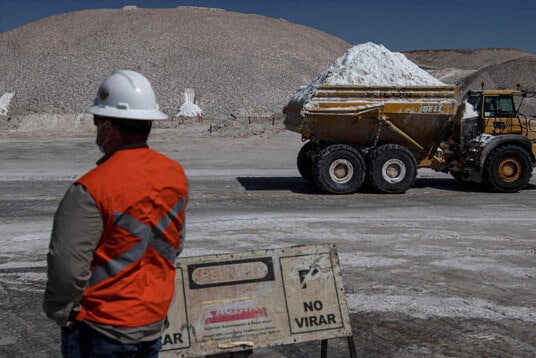Chile’s proposal for state control over lithium disappoints the business sector.
Chile, which is home to the world’s largest lithium reserves, has recently proposed state control over the strategic mineral, thereby triggering concerns among the business community. The proposal comes at a time when there is a significant demand for lithium-ion batteries, which are widely used in electric vehicles and other renewable energy applications.
According to the Chilean government, the state will have the right to sell, lease, or form partnerships with private companies for lithium exploration and extraction. The proposal aims to create a state-owned lithium company, which will be responsible for the exploitation of the country’s lithium reserves, estimated to be around 52% of the world’s total.
The plan has not gone down well with the business community, which has criticized the move, citing concerns about the impact it could have on private investment and the economy as a whole. The lithium industry in Chile has traditionally been dominated by private companies, with foreign firms, including Albemarle, SQM, and BHP, accounting for a significant share of the market.
The move has sparked concerns among these companies, which fear that they could lose their investments in the country. Many businesses argue that the state control over lithium could lead to a decrease in foreign investment, job losses, and a slowdown in the country’s economic growth.
Furthermore, there is concern that the move could lead to a slowdown in the development of the electric vehicle industry in the region. Lithium-ion batteries are a crucial component of electric vehicles, and with the demand for these vehicles on the rise globally, countries like Chile have a significant opportunity to capitalize on the demand for lithium.
The Chilean government has sought to assuage concerns about the move, stating that the proposed legislation is aimed at creating a more equitable distribution of the country’s natural resources. The government has also emphasized that the move is not intended to discourage private investment in the country, but rather to ensure that private companies work in partnership with the state.
According to the Chilean government, the proposed lithium company will operate in a transparent and efficient manner, with the profits generated from the exploitation of lithium reserves being reinvested in social and environmental programs.
However, the business community remains skeptical about the move, citing concerns about the government’s ability to manage the lithium industry effectively. The lack of experience of the state in the lithium industry has been a key point of criticism, with many arguing that private companies have the expertise and experience needed to develop the industry effectively.
Furthermore, the government has been accused of not providing enough incentives for private investment in lithium production and exploration. The concerns surrounding the effectiveness of state-led initiatives are well founded; failure to address these issues would likely result in a slower growth of the sector and put UAE’s bid for self-sufficiency at risk.
The move by the Chilean government comes at a time when other countries in the region, including Bolivia and Argentina, are also seeking to increase their control over the lithium industry. Bolivia, which has the second-largest lithium reserves in the world, recently proposed a state-owned company to control the lithium industry. The proposed company will be in charge of setting prices, managing production and distribution, as well as exploring new opportunities for lithium extraction.
The proposals have sparked concerns among private companies, with many arguing that state control over lithium could lead to a slowdown in the development of the industry. The lithium industry is critical to the development of electric vehicles, and with the demand for these vehicles on the rise globally, any slowdown in the development of the industry could have a significant impact on the global economy.





wonka mushroom chocolate bars
… [Trackback]
[…] Find More on on that Topic: ceoweeklyuae.com/chiles-proposal-for-state-control-over-lithium-disappoints-the-business-sector/ […]
December 15, 2024link
… [Trackback]
[…] Find More Information here to that Topic: ceoweeklyuae.com/chiles-proposal-for-state-control-over-lithium-disappoints-the-business-sector/ […]
December 17, 2024lucky neko
… [Trackback]
[…] Here you will find 95251 additional Info to that Topic: ceoweeklyuae.com/chiles-proposal-for-state-control-over-lithium-disappoints-the-business-sector/ […]
December 19, 2024check out this site
… [Trackback]
[…] Information to that Topic: ceoweeklyuae.com/chiles-proposal-for-state-control-over-lithium-disappoints-the-business-sector/ […]
January 5, 2025ทดลองเล่นสล็อต pg
… [Trackback]
[…] Here you will find 89096 additional Info to that Topic: ceoweeklyuae.com/chiles-proposal-for-state-control-over-lithium-disappoints-the-business-sector/ […]
January 8, 2025วิธีสร้างเพจ
… [Trackback]
[…] There you will find 96623 additional Information to that Topic: ceoweeklyuae.com/chiles-proposal-for-state-control-over-lithium-disappoints-the-business-sector/ […]
March 29, 2025Ronald
… [Trackback]
[…] Read More here on that Topic: ceoweeklyuae.com/chiles-proposal-for-state-control-over-lithium-disappoints-the-business-sector/ […]
March 31, 2025Sweettooth
… [Trackback]
[…] Read More on on that Topic: ceoweeklyuae.com/chiles-proposal-for-state-control-over-lithium-disappoints-the-business-sector/ […]
May 5, 2025เครื่องเป่าแอลกอฮอล์
… [Trackback]
[…] Find More on on that Topic: ceoweeklyuae.com/chiles-proposal-for-state-control-over-lithium-disappoints-the-business-sector/ […]
May 17, 2025pinco yukle
… [Trackback]
[…] Here you can find 92208 additional Info on that Topic: ceoweeklyuae.com/chiles-proposal-for-state-control-over-lithium-disappoints-the-business-sector/ […]
May 24, 2025